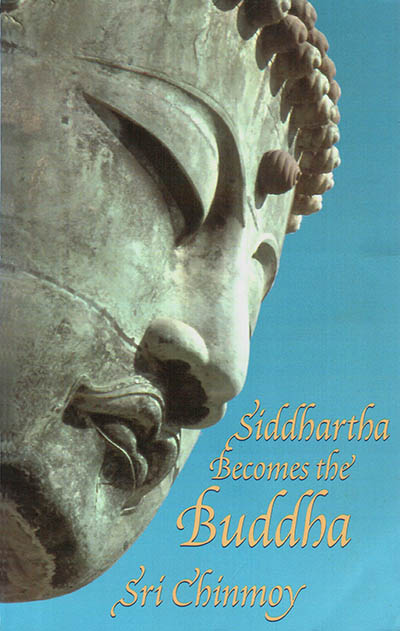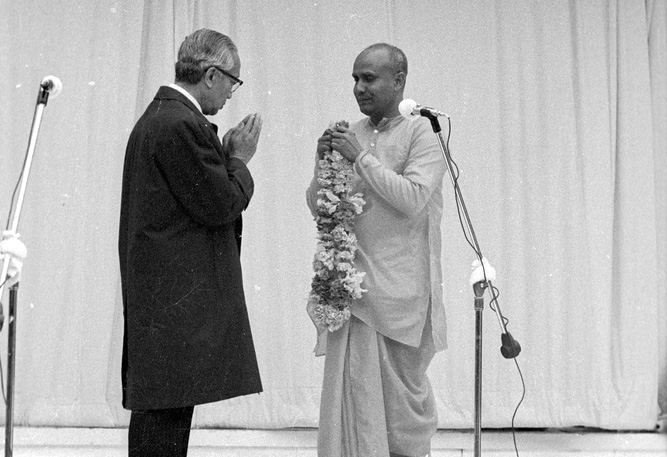Fear means
The absence of
God-oneness-love.

In this play, originally published in 1973, Sri Chinmoy captures significant episodes in the life of Lord Buddha. It includes conversations with disciples and a moving depiction of the Buddha's physical passing.
Read the full play: Sri Chinmoy Library
Siddhartha becomes the Buddha has been performed in several locations throughout the world. In 1973, Sri Chinmoy invited the then UN secretary-general U-Thant to a stage production of Siddhartha becomes the Buddha in New York, US. After watching the play, U-Thant offered kind words of appreciation for the way the play depicted the life of the Buddha.

"I feel it is a great privilege to be able to participate in this spiritually rewarding experience, and for this I am most grateful to our esteemed teacher, Sri Chinmoy, for this innovative undertaking… I find that Sri Chinmoy has done a most remarkable job in presenting the play in simple, understandable language for the uninitiated. His stress on the basic characteristics of Buddhism, on compassion, love, renunciation, peace, should stimulate the thought of leaders of men and leaders of thought everywhere. "
U Thant 1 25 May 1973, Harrison, New York.
Dramatis personae 2
(The Buddha with his disciples. Enter Rahul, his son. The disciples are all excited to see the Buddha’s young son.)
RAHUL: Father?
BUDDHA: Yes, my son?
RAHUL: Mother says that you have given joy to hundreds of people. Now I also want to have joy from you.
BUDDHA: My son, tell me what kind of joy you want from me.
RAHUL: I want my share of your wealth, your property. Everybody has become rich with your wealth. Now I want to be rich, too.
BUDDHA: My son, my wealth is of a different type. I have no money. I have no material wealth. I have only inner wealth, which is Peace, Light and Bliss.
RAHUL: Father, I know Mother has told me about your wealth. You have Infinite Peace, Infinite Love, Infinite Joy, Infinite Bliss. I want to have my share. I am your son. I want to follow your path.
BUDDHA: But you are a child, you are a little boy. How can you accept the path right now?
RAHUL: Father, what is wrong? Is your spirituality meant only for grown-up people and not for children? Is the Truth you have achieved only for the elderly? Is Truth not for everybody? Is God not for everybody, Father?
BUDDHA: Wonderful, my child, wonderful, my son! I accept my defeat. Truth is for all. And my Love, my Peace, my Light you can share, as others already share. I share with you my Joy, my Peace, my Illumination.
RAHUL: Father, have you accepted me as your disciple?
BUDDHA: Yes, I have accepted you with all my heart and soul, my son.
RAHUL: Then you have to accept another also. There is one more seeker you have to accept as your disciple.
BUDDHA: Who? Whom have I to accept, my son?
RAHUL: My mother. My mother wants to be your disciple.
BUDDHA (pauses): My son, I do not accept women as my disciples, my real disciples.
RAHUL: Father, why not? Are women not meant to realise the highest Truth? Your heart is big. Everybody says the Buddha’s heart is as vast as the infinite ocean. If your heart is so big, how then do you deny women the Truth that you have realised? Father, that is unfair. You have to accept my mother. And the day you accept her, you must accept all women.
BUDDHA: My son, I am truly proud of you. You are still a child, you have not yet seen even eleven summers, but your inner knowledge is profound. My son, your knowledge of Truth has given me enormous joy and pride. The world listens to me. I have hundreds of disciples and they listen to me with devotion. I listen to you with my heart’s pride and my soul’s joy. Go and tell your mother that I have accepted her also as my true disciple. Today I take both of you into the sangha, my spiritual community.
Dramatis personae 3
(King Prasenjit and Kshema.)
KING: Kshema, you are a great disciple of the Buddha. He is proud of your wisdom and I am fascinated by your spiritual insight. You have been at my palace for a few days, and you have given much wisdom to all the members of my royal family. I offer you my deepest gratitude.
KSHEMA: O King, I am so happy that I have been able to serve my Lord Buddha in your royal family.
KING: Kshema, tell me in a few words about Buddha’s philosophy. You have to forgive me, but I do not have much time. My work in the kingdom is simply killing me. I am overburdened, but I am deeply interested in Buddha’s philosophy. Tell me in a few words.
KSHEMA: Your Majesty, Buddha’s teaching is very simple. He gives us the message of renunciation. He gives us the message of compassion. It is through renunciation and compassion that one can enter into Nirvana.
KING: One thing more, O Kshema.
KSHEMA: Tell me.
KING: Why has Buddha not spoken about the soul? We Hindus all believe in the existence of the soul. Nothing can be done without the soul.
KSHEMA: True, he has not spoken about the soul, but he has spoken about the inner Light. What is that inner Light if not the soul? He has not used the term soul, but what he speaks of as the inner Light is nothing but the soul.
KING: He has not used the term God. We Hindus believe in God.
KSHEMA: True, he has not used the term God. But he has used the term Truth. What is Truth? Truth is God. God is Truth. The moment you realise the Highest Truth, you will realise God the Infinite.
KING: It seems to me that Buddha has not spoken about life after death or about life after Nirvana.
KSHEMA: True, Buddha has not spoken about life after death and life after Nirvana, but he has told us why death exists, and he has told us a little about Nirvana. He has given us the message of peace. Death exists when there is no peace. When you have peace, there is no death. As for the life after Nirvana, first we have to know what Nirvana is. Nirvana is infinite Delight. What can there be after infinite Delight?
KING: I don’t understand your philosophy, Kshema.
KSHEMA: Let me try to make it clear to you. From your palace you can see the Ganges?
KING: Yes.
KSHEMA: You can see the sand on the bank of the Ganges. Now send whomever you want from your kingdom to count the number of grains of sand. Or send somebody to measure the weight of the ocean. Can anybody from your kingdom do it, your Majesty?
KING: I am sorry, I do not think anybody can count the number of grains of sand on the shore, or measure the weight of the ocean.
KSHEMA: True. Nobody can count the grains of sand on the bank of the Ganges or weigh the water in the ocean. Similarly, when you enter into Nirvana, there Bliss is infinite. It cannot be measured, weighed or counted. It is unfathomable. In that highest realm of Bliss we see the meeting place of existence and non-existence. There non-existence and existence are inseparable, indescribable.
Dramatis personae 4
(The Buddha and Ananda.)
BUDDHA: Ananda, I am now an old man. I am eighty years old. Ananda, for fifty years I have been teaching and preaching. The time has come for me to depart from this world. I am weak. I am an invalid. My whole body is shattered, Ananda. This body can be of no more use here on earth.
ANANDA (shedding tears): No, Master, no. You have to stay with us for quite a long time more. Your very presence is a great blessing to humanity. This sangha is not yet well established. This sangha needs your physical presence.
BUDDHA: Ananda, do you mean to say that the sangha expects something new from me? Do you mean to say that I have not spoken in clear terms what I have to say about this dharma? I have not kept anything hidden from you people. Never have I shown any sign of reticence, nor any indifference. Besides, I never thought that I would have to conduct and manage the sangha, and that it would always depend on me. So why should I stay? Why should I be involved any longer in the activities of the sangha? Ananda, from now on be self-sufficient. Have faith in yourself. Lead a spiritual life. You will realise the highest Truth. He who follows the dharma, he who takes refuge in the dharma, will alone enter into the world of Bliss, and nobody else.
ANANDA: O Lord Buddha, what you say is perfectly true, but our hearts cannot live without you. We need you. We shall eternally need you.
BUDDHA: Ananda, you need me. I need you. Again, the Truth Eternal needs us both. The Truth Eternal needs me in the world of the Beyond, and the same Truth needs you here on earth. My life has come to an end. All the experiences of the world I offer to the world. Yesterday I ate at Chunda’s house. Since then I have been feeling weaker, but I wish to assure you that this weakness is not due to his food. I am suffering, true, but it is not his fault at all. He gave me food with utmost love and devotion. Nobody should blame him when I die. I offer him my deepest blessings. Before I was illumined, before I became the Enlightened One, Sujata’s food helped me to live on earth. Her food made it possible for me to meditate. And now Chunda’s food is helping me to enter into the highest Nirvana. I see no difference between Sujata’s food and Chunda’s food. Each has served a special purpose of its own.
(Enter a few intimate disciples.)
ANANDA: Look! Look! Today the Buddha’s whole body is flooded with Light. This Light we have never seen around him. Such celestial Light!
THE DISCIPLES: Yes, Lord, today we see something totally new in you which we have never seen before. Your whole face is inundated with Light and Delight.
BUDDHA: Ananda, today reminds me of my days at the foot of the Bodhi tree. Just before I entered into Nirvana this body had the same Light, the same Delight. Today once again this body is flooded with Light and Delight. You are seeing it for the first time. But I am seeing it for the second time. The day ends, and my earthly sojourn ends along with it. Therefore, all of you are seeing this Light in me and around me.
(Ananda bursts into tears and is about to leave.)
BUDDHA: Ananda, stay here. Don’t go away. My life can now be measured in minutes. Ananda, do not cry for me. I tell all of you not to cry for me. Ananda, I have told you repeatedly that everything is transient on earth. There is nothing everlasting here. Anything that comes into life will have to give up life. You have served me, O Ananda, most devotedly, most soulfully, and for that I offer you my last blessings. Proceed on your inner strength, and you will receive liberation. You will have your liberation in due course. My spiritual journey began with renunciation and compassion, and today, at the end of my journey’s close, I offer to the world the same message: renunciation and compassion. O Ananda, do not grieve.
(The Buddha dies.)
Sri Chinmoy, Siddhartha becomes the Buddha, Agni Press, 1973.↩︎
Sri Chinmoy, Siddhartha becomes the Buddha, Agni Press, 1973.↩︎
Sri Chinmoy, Siddhartha becomes the Buddha, Agni Press, 1973.↩︎